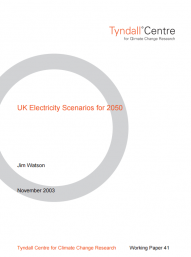
UK Electricity Scenarios for 2050

The recent energy White Paper included a commitment to a 60% reduction in UK carbon emissions by 2050. To achieve this reduction will require radical changes to energy supply and demand. Many of the most important changes are likely to affect the UK electricity system. A decarbonised electricity system will require large contributions from renewable and other low carbon energy sources (e.g. fuel cells, micro CHP and possibly nuclear). It will also need to facilitate significant amounts of electricity storage technologies, and substantial reductions in demand. At the same time, it is essential that the operational security of the electricity system be maintained. This paper builds on the work of the Royal Commission on Environmental Pollution (RCEP) report: Energy – The Changing Climate. The RCEP report includes four scenarios that explore options for a 60% reduction in UK carbon emissions by 2050. The paper elaborates these scenarios, and applies them to the UK electricity system. The paper establishes electricity generating plant capacities, load factors and annual outputs for each scenario. It also compares these outputs with electricity demand figures from the RCEP report. The analysis in this paper shows that the RCEP scenarios imply a radically different electricity system to the one we have today. In all scenarios, the system is more decentralised with more generating capacity and a greater contribution from renewable energy sources. At the same time, electricity demand has been held at 1998 levels or reduced by up to a third. The scenarios include large variations in the capacities and types of generating technology that will be required to meet this demand.
- Issues:
- Infrastructure, Energy, Natural Resources, Technological innovation
- Region:
- Europe
- Country:
- United Kingdom
- Year Published:
- 2003
- Author:
- Jim Watson
- Institution:
- Tyndall Centre for Climate Change Research

